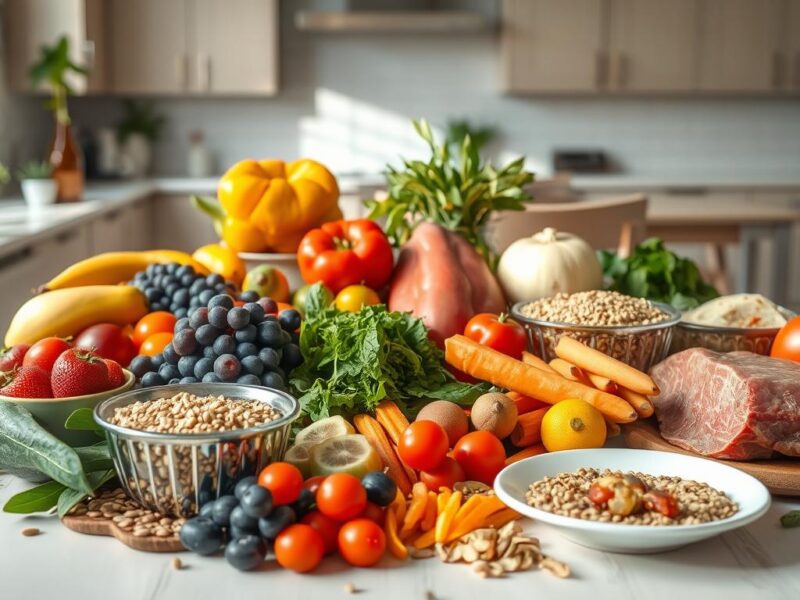Did you know 95% of people who diet gain back weight within one to five years? This fact shows how hard it is to lose weight and keep it off. It’s all about managing hunger and eating fewer calories.
Good weight loss tips aren’t about cutting out food completely. It’s about controlling your appetite smartly. By changing how you eat, losing weight can become easy and fun.
It’s possible to lose weight without always feeling hungry. With the right strategies, you can stay full and reach your fitness goals. Learning to listen to your body and using specific techniques can lead to lasting results.
Key Takeaways
- Protein is your secret weapon for feeling full longer
- Hydration plays a critical role in appetite management
- Mindful eating reduces unnecessary calorie consumption
- Strategic meal planning prevents unexpected cravings
- Exercise can naturally suppress hunger signals
- Sleep and stress management impact weight loss success
Understanding Hunger and Weight Loss: The Science Behind Appetite Control

Knowing how your body controls hunger is key for managing weight. Your appetite isn’t just about wanting to eat less. It’s a mix of hormones, signals, and mind factors that affect weight loss strategies.
The Role of Hunger Hormones
Your body has special hunger hormones that manage your appetite. Two important ones are:
- Ghrelin: Known as the “hunger hormone,” it tells your brain it’s time to eat
- Leptin: The “fullness hormone” that lets you know when you’re full
How Your Body Signals Fullness
Fullness signals are complex. Your body uses hormones like cholecystokinin and peptide YY to show when you’re full. These hormones help you know when to stop eating, preventing too much food.
The Difference Between Physical and Emotional Hunger
Not all hunger is the same. Knowing the difference can change how you see food.
Emotional eating can stop your weight loss. Physical hunger grows slowly and can be filled with many foods. But emotional hunger:
- Appears suddenly
- Wants specific foods
- Keeps coming even when you’re full
By spotting these signs, you can find better ways to handle hunger hormones and fullness signals. This helps your weight loss journey.
Power of Protein: Your Secret Weapon Against Hunger

Protein is your ultimate ally in weight management and appetite control. When you increase your protein intake, you unlock a powerful tool for satiety. This can transform your diet and help you achieve your fitness goals.
“Protein isn’t just a nutrient – it’s a metabolic game-changer for weight loss.” – Nutrition Experts
Protein works magic in your body by triggering key hormonal responses. It boosts the satiety hormone GLP-1, which signals fullness. At the same time, it reduces ghrelin, the hunger hormone. This dual action helps you feel satisfied and prevents unnecessary snacking.
- Increases feeling of fullness
- Burns more calories during digestion
- Stabilizes blood sugar levels
- Supports muscle maintenance
Aim to consume approximately 30 grams of protein per meal. You can find high-protein foods in meal prep options like lean chicken breast, low-fat dairy, and plant-based protein sources.
| Protein Source | Protein (grams) | Additional Benefits |
|---|---|---|
| Chicken Breast | 31g per 100g | Low fat, high nutrient density |
| Greek Yogurt | 17g per serving | Probiotics, calcium |
| Salmon | 22g per 100g | Omega-3 fatty acids |
Remember, consistency is key. Your body responds best to steady protein intake. This supports metabolism and helps manage weight effectively.
Strategic Hydration: How Water Helps Control Appetite
Water is a key player in your weight loss journey. It’s often overlooked but can make a big difference. Learning how water affects hunger can change how you eat and feel.

Your body might think it’s hungry when it’s really thirsty. Drinking water before meals can make you feel full. This might help you eat fewer calories.
Timing Your Water Intake
Knowing when to drink water can help control hunger. Here are some tips:
- Drink a large glass of water 15-20 minutes before meals
- Consume approximately 500 ml of water to potentially boost metabolism by 25-30%
- Aim for 2.2-3 Liters of daily fluid intake
Water-Rich Foods for Satiety
Water-rich foods can help you feel full. They’re not only hydrating but also nutritious:
- Watermelon
- Cucumber
- Zucchini
- Strawberries
- Lettuce
“Hydration is not just about drinking water, but about choosing foods that support your body’s water needs.” – Nutrition Expert
Hydration Schedule Tips
Staying hydrated can help with hunger and weight loss. Use a phone app or a marked water bottle to track your intake.
Remember, your body might sometimes misinterpret thirst as hunger. By maintaining proper hydration, you can more accurately recognize true hunger signals.
Fiber-Rich Foods: Nature’s Appetite Suppressants

Dietary fiber is a key to controlling hunger and keeping your digestive system healthy. It slows down digestion, making you feel full for longer. This can help you eat less and support your weight loss goals.
Not all fibers are the same. Viscous fibers in plant-based foods are best at making you feel full. They send signals to your body that you’re full and cut down on cravings.
“Fiber is like a natural appetite manager for your body” – Nutrition Experts
Top Fiber-Rich Foods for Appetite Control
- Barley (contains powerful beta-glucan fiber)
- Beans and legumes
- Nuts and seeds
- Apples and pears
- Oats
- Sweet potatoes
Studies show how fiber helps with hunger. Eating rye bread with 8-10 grams of fiber can make you feel full for hours. Beta-glucan fiber also helps with insulin sensitivity and blood pressure.
Maximizing Fiber’s Benefits
- Aim for diverse fiber sources
- Combine fiber with lean protein
- Gradually increase fiber intake
- Stay hydrated
Adding high-fiber foods to your diet helps your digestive health. It also naturally reduces hunger and aids in weight management.
Mindful Eating Techniques for Better Portion Control
Losing weight doesn’t mean you have to be hungry all the time. Mindful eating is a great way to control your portions. It can change how you see food. Studies show it’s as good as diet programs for weight loss.

Eating mindfully is more than a trend. It’s a useful method to understand your hunger and make better food choices.
Practicing Mindful Eating
Mindful eating means fully enjoying your meals. Here are some key practices:
- Eat slowly and deliberately
- Chew thoroughly to savor flavors
- Pay attention to food textures
- Notice your body’s hunger and fullness cues
Creating a Distraction-Free Eating Environment
Make your meals better by removing distractions:
- Turn off electronic devices
- Sit at a dedicated eating area
- Use smaller plates to control portions
“Mindful eating helps you listen to your body’s true hunger signals, not emotional cravings.”
Mindful Eating Exercises
| Exercise | Benefit |
|---|---|
| Hunger Rating | Assess hunger before and after meals |
| Pause Before Eating | Increase eating awareness |
| Mindful Breathing | Reduce stress-related eating |
Using these mindful eating methods can help you control your portions better. You won’t feel like you’re missing out. Studies show people lost about 4 pounds in 12 weeks. This shows how powerful being aware of your eating can be.
Smart Meal Planning for Sustained Energy

Creating a good meal plan can change how you think about food and energy. How you prepare your meals is key to keeping your energy up all day. It’s not just about counting calories. It’s about making sure your body gets the nutrients it needs.
“Preparation is the key to nutritional success and sustained energy.” – Nutrition Expert
Begin by making a meal plan that follows important nutrition rules:
- Prioritize lean protein sources for muscle maintenance
- Include complex carbohydrates for steady energy release
- Integrate healthy fats for metabolic support
- Plan meals that provide nutrient diversity
Your meal planning should aim for variety and efficiency. Here are some protein-rich foods that you can prepare ahead of time:
| Protein Source | Preparation Time | Versatility Rating |
|---|---|---|
| Chicken Breast | 20 minutes | High |
| Greek Yogurt | 0 minutes | Very High |
| Egg Whites | 5 minutes | High |
Pro tip: Batch cooking protein sources can save time and support consistent energy levels throughout the week. Spending a few hours on food prep can lead to better nutrition and less impulse eating.
Good meal planning is about building lasting habits that help your health and fitness goals. It should be flexible, fun, and fit your unique nutritional needs.
10 Diet Hacks to Lose Weight Without Feeling Hungry
Losing weight doesn’t mean you have to feel hungry all the time. Smart diet hacks can help you control your appetite. This way, you can reach your weight loss goals without feeling deprived.

Managing your weight is more than just counting calories. Let’s look at some powerful diet hacks. They can make you feel full while you lose weight.
Pre-Meal Strategies
- Drink 16 ounces of water 15 minutes before meals to reduce hunger
- Consume a small protein-rich appetizer like Greek yogurt
- Do light exercises such as walking to boost metabolism
During-Meal Tactics
- Use smaller plates to create visual portion control
- Eat slowly and chew each bite thoroughly
- Practice mindful eating by eliminating distractions
Studies show that eating more protein can increase your metabolism. By planning your meals well, you can eat fewer calories without feeling hungry.
Post-Meal Habits
- Chew sugar-free gum to reduce additional snacking
- Drink herbal tea to support digestion
- Engage in light physical activity like stretching
“The key to successful weight loss is not about restriction, but about making smart, sustainable choices.” – Nutrition Expert
Using these diet hacks can lead to healthier eating habits. And it helps you stay in a calorie deficit. Remember, sticking to it is key to your weight loss journey.
The Role of Exercise in Appetite Management

Physical activity is key in managing appetite and losing weight. It changes how your brain handles hunger signals. This is more than just burning calories.
Exercise affects appetite in several ways:
- Reduces activation of brain regions linked to food cravings
- Decreases hunger hormone levels
- Increases feelings of fullness
- Improves metabolic efficiency
Different exercises have different effects on appetite. High-intensity interval training and strength training are very effective.
“Exercise is not just about burning calories, but reshaping your body’s relationship with food.”
Studies show that mixing cardio and strength training is best for managing appetite and losing weight. Your workout can help control hunger and reach your fitness goals.
| Exercise Type | Appetite Impact | Recommended Frequency |
|---|---|---|
| High-Intensity Interval Training | Suppresses appetite | 2-3 times per week |
| Strength Training | Regulates hunger hormones | 3-4 times per week |
| Moderate Cardio | Reduces food cravings | 4-5 times per week |
Keep in mind, everyone reacts differently to exercise. Pay attention to how your body responds. Adjust your activity to get the best results for appetite control and weight loss.
Sleep and Stress: Hidden Factors Affecting Hunger

Did you know that sleep quality and stress levels can affect your weight? Research shows a link between sleep, stress, and appetite hormones. This can help or hinder your health goals.
About 35% of US adults sleep less than 7 hours a night, says the Centers for Disease Control and Prevention. This lack of sleep messes with your hunger signals and metabolism.
“Sleep is not a luxury, it’s a biological necessity for maintaining a healthy weight and balanced appetite.” – Sleep Research Expert
How Sleep Affects Appetite Hormones
- Lack of sleep increases ghrelin (hunger hormone)
- Disrupts leptin (fullness hormone) production
- Can lead to consuming an extra 385 calories per day
Managing stress is key to controlling your appetite. Chronic stress raises cortisol levels. This can make you crave food more and mess with your weight goals.
| Sleep Duration | Obesity Risk Increase |
|---|---|
| Less than 7 hours | 41% increased risk |
| Infancy | 40% increased risk |
| Adolescence | 30% increased risk |
Practical Tips for Better Sleep and Stress Control
- Aim for 7-9 hours of sleep nightly
- Practice meditation or deep breathing
- Limit caffeine intake after 2 PM
- Create a consistent sleep schedule
By focusing on sleep and stress management, you can control your appetite hormones. This helps support your weight goals.
Natural Appetite Suppressants and Herbs
Looking for natural ways to control your appetite can change your weight loss journey. Natural appetite suppressants help manage hunger and support your diet goals. They do this without using artificial supplements.
Powerful Herbal Remedies for Appetite Control
Many herbs and spices can help control your appetite and aid in weight loss. Here are some top natural appetite suppressants:
- Ginger: Reduces appetite and increases fullness
- Fenugreek: Increases satiety and decreases fat consumption
- Green tea: Boosts metabolism and suppresses hunger
- Peppermint: Can reduce total calorie intake
Smart Dosage and Timing Guidelines
| Herb | Recommended Daily Intake | Potential Benefits |
|---|---|---|
| Ginseng | 8 grams extract | Facilitates weight loss |
| Cumin | 3 grams twice daily | Supports weight loss and reduces cholesterol |
| Capsaicin | 2-4 mg daily | Decreases daily calorie intake |
Safety Considerations for Herbal Supplements
Herbal remedies can be great dietary aids, but use caution. Always consult with a healthcare professional before starting any new weight loss supplements. Some herbs may interact with medications or have side effects.
Natural doesn’t always mean completely safe. Professional guidance is key to responsible supplement use.
Your journey with natural appetite suppressants should be personalized and mindful. Use these herbal remedies with a balanced diet and regular exercise for the best weight loss results.
Smart Food Choices and Meal Timing
Starting a weight loss plan means making smart food choices and knowing when to eat. A balanced diet helps control hunger and aids in losing weight. It’s all about picking nutrient-dense foods that fill you up without too many calories.
Here are some tips for better meal planning and nutrition:
- Focus on protein-rich foods that promote satiety
- Incorporate whole grains and fiber-packed vegetables
- Choose foods with high nutritional value and low calorie density
Studies show that when and what you eat matters for weight control. Eating big meals early can help keep your metabolism up and hunger down. A 2020 study found that eating eggs for breakfast can help with weight loss on a low-calorie diet.
“Your body is a reflection of your consistent choices, not occasional efforts.” – Nutrition Expert
Try different eating schedules to see what works for you. Some like three big meals, while others prefer smaller, more frequent ones. The aim is to find a routine that keeps you full and energized.
Pro tip: Listen to your body’s hunger and fullness signals. It can take up to 20 minutes for your brain to realize you’re full.
- Choose whole, unprocessed foods
- Listen to your body’s hunger and fullness signals
- Stay hydrated throughout the day
Conclusion
Getting to a healthy weight is more than a quick fix. It’s about building a lifestyle that lasts. The tips we’ve shared help you manage your weight without feeling hungry or stuck to strict rules.
Your path to success includes eating the right amount of protein, eating mindfully, and staying active. Making small, steady changes can help you lose 1 to 2 pounds each week. This can also make you healthier overall. Losing just 5% of your weight can lower your risk of heart disease and type 2 diabetes.
Start with simple habits like cooking at home and eating slowly. Choose foods that are full of nutrients. These habits are key to keeping the weight off. Also, make sure to exercise regularly, aiming for 30 minutes of aerobic activity most days. Include strength training twice a week to boost your metabolism and reach your health goals.
Your weight loss journey is special and yours alone. Take a holistic approach that feeds your body and mind. With patience, consistency, and the right strategies, you can change how you see food. And you’ll get lasting, healthy results.


